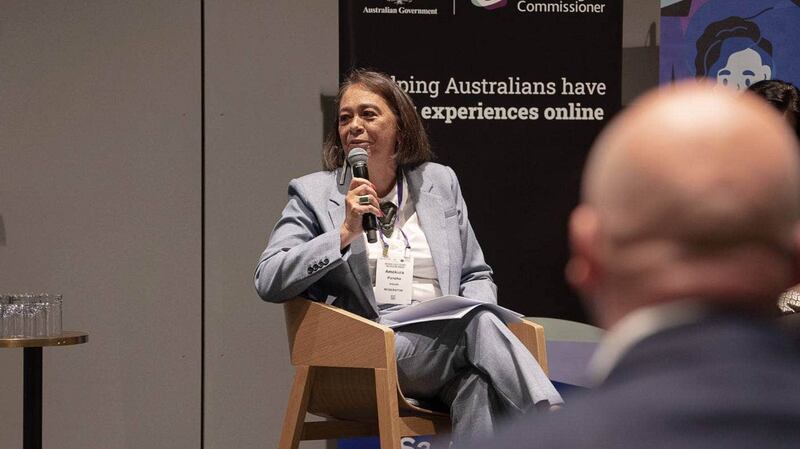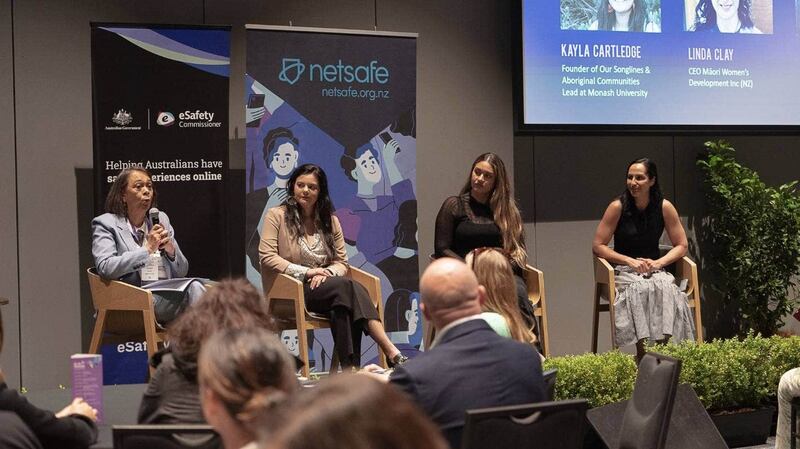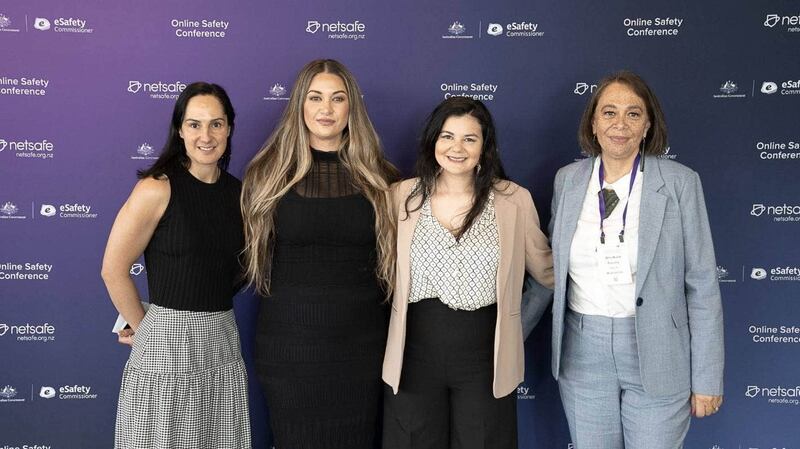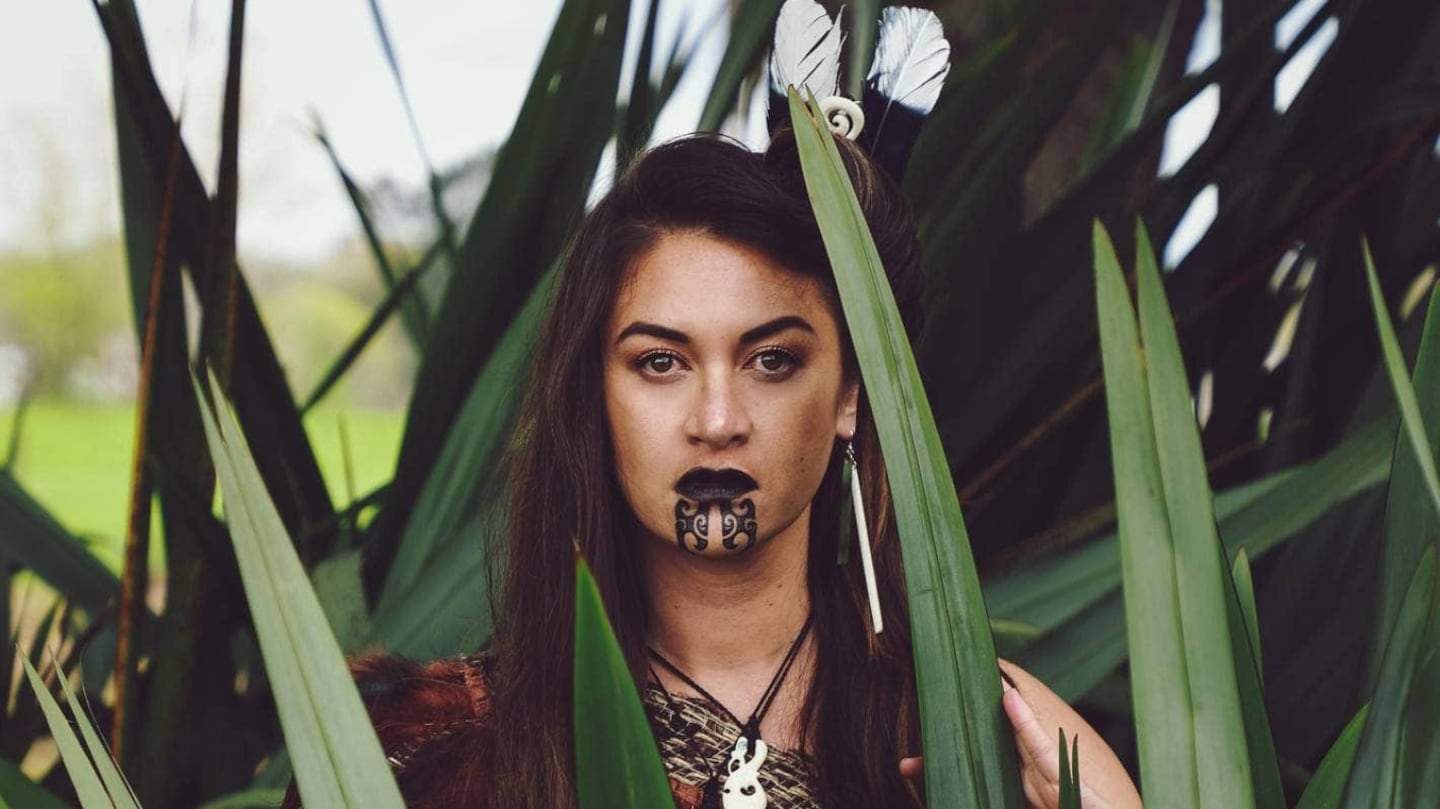A harmless selfie of two wāhine Māori in moko kauae stencils ending up on a pornography website is one example of how the internet has become another way to marginalise indigenous women.
There was raw emotion from the stage at Te Pae in Christchurch on Tuesday as indigenous wāhine from different backgrounds spoke with moderator and Netsafe poutaki mātauranga Māori Amokura Panoho.
New Zealand’s online safety organisation, Netsafe, partnered with Australia’s eSafety Commissioner for the conference – bringing together world-leading online safety professionals to explore the human experience in online spaces.
Taaniko Nordstrom started a kaupapa 10 years ago, Soldiers Rd, which was a “grassroots idea” of using modern media and traditional clothing to recreate images of the past for whānau.
“Little did I know that over-saturating the internet with powerful images would have some negative effects.”
Images were reused without permission, like one customer’s image being used on an American duvet cover design, and her own image being turned into a painting on rapper Eminem’s lounge wall.

But it was a selfie of her and her business partner wearing moko kauae stencils at an event in Perth in 2014 that caused the most strife.
“I didn’t think anything of it, and posted it on Facebook.”
It was then taken and used on a new Facebook page without permission. From there it went worldwide.
It was sold on Russian art sites, and eventually made it to a pornography website in 2018, in an advertisement captioned “Do you want to f... Māori girls?” in the exotic section.
“It was because I was Māori, that’s why I ended up in that space.”
Netsafe could do nothing about it, despite her reaching out for support when she said many indigenous women would not.
“It is still there to this day.”
It was the first time she had spoken about it publicly due to not wanting to upset her father, who passed away last year.
But now pregnant with a daughter, Nordstrom wanted to be part of the conversation for change.
She had thought long and hard about how what happened to her could have been stopped, and she believed it lay with Wai 262, also known as the Fauna, Flora and Intellectual Property Rights claim.
Lodged in 1991, it is one of the most complex and far-reaching inquiries in the Waitangi Tribunal’s history and is currently led by Te Taumata Whakapūmau, asserting “Māori control over things Māori”, essentially seeking to restore tino rangatiratanga (Māori self-determination).
“[People/Government] wouldn’t consider our images taonga, but I do.”

Our Songlines founder and Monash University Aboriginal communities lead Kayla Cartledge became emotional talking about the effect the failed Voice vote had in Australia.
“We were getting messages saying, ‘Why don’t we just complete the genocide?’”
But all the abuse met the standards on online platforms.
“What didn’t meet Meta community standards was when we posted saying this apparently meets Meta standards.
“I’ve never seen my community hateful.”
But the narrative, propped up by the news, social media, was misinformation, vilification and unfair standards that “we’re expected to wear the burden of your free speech”.
Panoho told Stuff the internet had become another mechanism to marginalise women, particularly indigenous women, at a “rampant” pace.
“The recent election highlighted some of the ways in which social media can proliferate some of that bad behaviour.
“There is an increased pace and frequency and ferocity of it.”
She uses the whakataukī “Me aro koe ki te hā o Hine-Ahu-One”, which means “Pay heed to the dignity of women” for the conference session.
But she believed online had not become the environment that would help empower indigenous women, “which we hoped it would be”.

She used the example of the treatment of MP Nanaia Mahuta, and online tools – like a Tremain whale cartoon on Three Waters – utilised “to break her”.
“Evidence suggests people think their identity is being marginalised and it’s their reaction to that.
“Māori women sit at the cross-hairs of misogyny and racism.”
The laws in New Zealand were “very weak” in combating it, and the onus and burden of proof was usually on the victim.
After Covid-19 began, wāhine Māori increasingly turned to online businesses, but correlated to that was “the harm they are now experiencing as a consequence of having that visibility”.
Netsafe was the “only lifeboat”, and Panoho’s job was to make Netsafe a valued place for wāhine Māori to go to for online safety help.
“It’s important to know that we can take control. We’re not just going to be spectators.”
She called for increased funding to allow for more research on the issue.
Māori Women’s Development Inc CEO Linda Clay called for internet regulators to think about indigenous women when going about their job.
The conference was attended by experts from Meta, TikTok and Microsoft, and the keynote speakers included University of California Berkley Professor Hany Farid, Moonshot founder Vidhya Ramalingam and Stanford lecturer and former US human rights attorney Brittan Heller.
Netsafe CEO Brent Carey said New Zealand online safety measures were yet to develop as quickly as needed.
Everyone deserved to be safe online “and the online safety ecosystem needs to come together to make that happen”.



